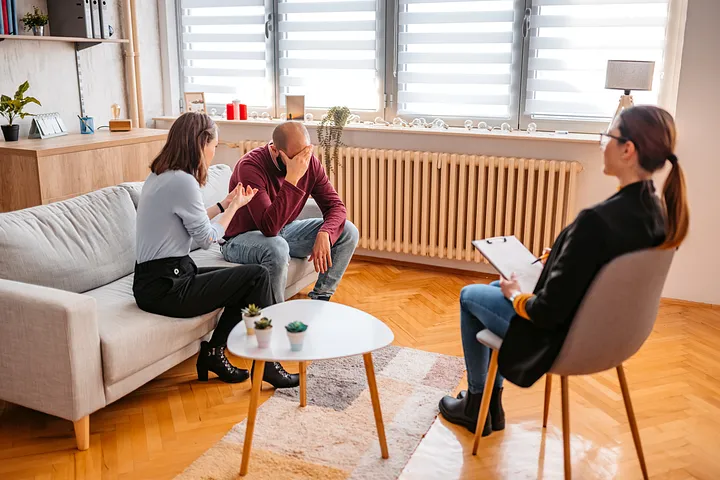
What Are the Stages of Couple Counsellors?
Relationships are journeys, filled with moments of joy, intimacy, and sometimes, conflict. When challenges arise, seeking professional guidance through couple counsellor can be a powerful step towards a stronger bond. But what exactly happens during couple counsellor? Understanding the different stages can help you feel more prepared and optimistic about the process.
Stage 1: Assessment and Building Trust
The first stage lays the groundwork for successful therapy. The counsellor will likely meet with each partner individually to create a safe space for open communication. This allows them to understand each person’s perspective on the relationship’s strengths and weaknesses.
During these initial sessions, the counsellor will also:
- Gather background information: This includes the couple’s history, family dynamics, and any past attempts at counselling.
- Identify core issues: While couples may present with specific concerns (communication problems, infidelity), the counsellor helps them uncover deeper underlying issues.
- Establish goals: What do you both hope to achieve through counselling? Is it to improve communication, rebuild trust, or make a decision about the future of the relationship?
Building trust with the counsellor is crucial. You should feel heard, respected, and comfortable expressing yourselves openly and honestly. The counsellor will act as a neutral facilitator, ensuring balanced communication and preventing one partner from dominating the conversation.
Stage 2: Understanding Your Patterns
Once a foundation is built, the counsellor will delve deeper into the couple’s interaction patterns. This may involve:
- Identifying communication styles: Do you tend to bottle emotions or become overly critical? The counsellor will help you understand how these styles impact your interactions.
- Recognizing triggers: What situations or behaviors typically lead to arguments? Understanding your triggers empowers you to manage them constructively.
- Uncovering emotional needs: Often, conflict arises from unmet emotional needs. The counsellor can help you identify these needs and explore healthier ways to express them.
Through role-playing exercises and guided discussions, the couple counsellor can help you see your interactions from a new perspective. This increased awareness allows you to take responsibility for your own contribution to the problems and become more empathetic towards your partner.
Stage 3: Developing New Skills
Now that you have a clearer understanding of your patterns, it’s time to build new tools for healthier communication. The counsellor might introduce techniques like:
- Active listening: This involves truly focusing on your partner’s perspective, reflecting back their emotions, and avoiding interrupting.
- “I” statements: Expressing your feelings and needs in a way that avoids blame, such as “I feel hurt when you…”
- Effective conflict resolution: Learn to navigate disagreements without resorting to destructive behaviors like name-calling or stonewalling.
The counsellor will guide you in practicing these skills in a safe environment, allowing you to experiment and build confidence.
Stage 4: Putting It into Practice
Stage four is about applying your newfound skills in your everyday life. The counsellor may assign homework exercises, such as practicing active listening during a specific conversation at home.
During sessions, you will discuss the challenges and successes you encountered while using these skills. The counsellor will provide ongoing feedback and support as you navigate these real-world situations.
Stage 5: Moving Forward
The final stage focuses on maintaining progress and planning for the future. The counsellor will help you:
- Develop relapse prevention strategies: Identify potential triggers and create plans to manage them effectively.
- Celebrate your achievements: Acknowledge the progress you’ve made and celebrate the improvements in your relationship.
- Decide on next steps: Do you need to continue with regular sessions, or is it time to space them out? The counsellor will help you create a plan based on your specific needs.
Remember, couple counselling is not a one-size-fits-all process. The number of stages and the time spent in each stage will vary depending on the couple’s unique situation and goals. However, understanding this general framework can give you a sense of what to expect and empower you to actively participate in your journey towards a stronger, healthier relationship.
Additional Considerations
- Finding the right counsellor: Look for a qualified therapist experienced in couple counselling with a therapeutic approach that resonates with you.
- Commitment is key: Both partners need to be committed to the process for couple counselling to be successful.
- It won’t always be easy: There will be setbacks, but with continued effort and the guidance of your counsellor, you can overcome them.
Couple counselling can be a transformative experience, providing you with the tools and support you need to build a more fulfilling and lasting relationship. By navigating the stages together, you can strengthen your bond and create a brighter future for your





Leave Your Comment